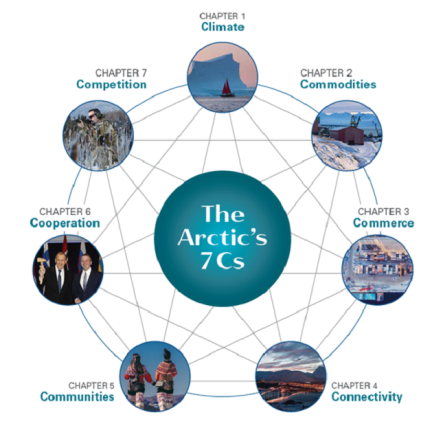-
Navigating the Arctic’s 7Cs
December 3, 2021 By Iris Thatcher“It seems incumbent upon the Arctic policy community to identify the most pressing issues to address in the region while simultaneously, effectively and creatively communicating their complexities and interrelated nature,” writes Mike Sfraga, founding director of the Wilson Center’s Polar Institute, in a new Wilson Center monograph, Navigating the Arctic’s 7Cs. Policy priorities in the Arctic boil down to climate, commodities, commerce, connectivity, communities, cooperation, and competition, writes Sfraga. The “7Cs” provides a framework that policymakers can use when engaging in Arctic affairs.
Through chapters written by experts in their respective fields, Navigating the Arctic’s 7Cs explores each of the Cs in detail. Starting with climate, Brendan Kelly and Elizabeth Francis analyze how contemporary climate change is human-driven. The effects are amplified in the Arctic, threatening ecosystems and ways of life for Indigenous communities.
Despite these risks, melting ice generates economic opportunities for commodities and commerce in the Arctic. Mark Myers examines how previously inaccessible natural resources such as energy, fish, and rare earth materials will become increasingly accessible in a warmer Arctic. So will shipping routes—and Lawson Brigham investigates how international shipping regimes will need to address the new passages emerging in the Arctic.
These environmental and economic factors precipitate an increasingly connected Arctic, as Alyson Azzara highlights in her chapter. Moving beyond traditional definitions of “connectivity,” Azzara underscores the need for connections among people, in the Arctic environment, and across infrastructure and economic sectors. Further, bridging communities and growing an understanding of their respective priorities will help policymakers tackle sustainability in the region, writes Gwen Healey Akearok. Drawing on personal experiences in Iqaluit, Canada, Akearok writes, “Lived experiences of thriving northern communities revealed open-mindedness about diversity, what it means to be healthy, and recognizing and celebrating diverse ways of living and being.”
Consequently, the nature of geopolitical cooperation and competition has drastic impacts on stability in the region. David Balton describes the Arctic as a place of historical cooperation, based on institutions in the region such as the Arctic Council, as well as varying international agreements. Regardless, as more nations and vested parties become interested in the Arctic’s economic and security dynamics, Jim Townsend and Stacy Closson stress that great power competition in the Arctic is a key concern for the United States.
Together, the 7Cs provide a framework for policymakers—both Arctic and non-Arctic—to identify and address major issues facing the region. The monograph’s seven chapters reveal interconnectedness between these drivers, capturing a holistic outlook of the Arctic.
Read more:
- Wilson Center NOW Interview with Mike Sfraga on Cruising the “7Cs”.
- Climate change can bring both challenges and opportunities to the Arctic.
- What are some of the issues surrounding governance gaps within the Arctic?
Iris Thatcher is a Polar Institute staff assistant intern at the Wilson Center and a graduate student at Georgetown University, pursuing an MA in European Studies.
Photo Credit: Graphic of the 7Cs, courtesy of the Wilson Center.
 A Publication of the Stimson Center.
A Publication of the Stimson Center.




